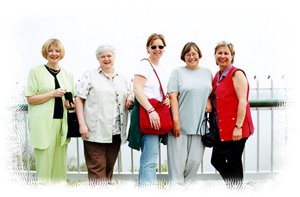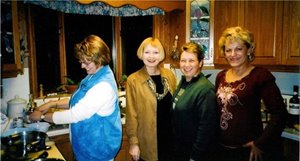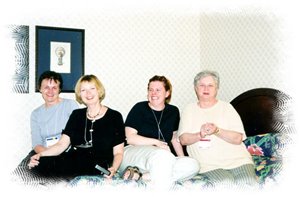Pat Letendre interviews our TM colleagues - past & present:
It's my pleasure, indeed an honour, to write a series of blogs for CSTM to celebrate the careers of transfusion professionals who came before and made a difference. Some names you may recognize, some you may not. But rest assured these diverse individuals all made a difference and we are the better for it.
Each blog begins with my musings on the individual, followed by a brief background on the person's career, sometimes with my comments throughout. If you're looking for a rah-rah, rosy view of Canada's transfusion medicine field, this ain't it. Why? Although all participants enjoyed their careers and love the transfusion profession, they also speak honestly about both the ups and downs. Perhaps their reflections will resonate with your experiences.
I will remember you: Dianne Powell
This blog features Dianne Powell, a medical laboratory technologist (MLT) I first met 36 years ago in Edmonton. In retrospect that was a very lucky day for me as I met probably the kindest and most humble person I know, someone I've respected and admired for decades. And who, surprisingly, also has a delightfully wicked sense of humour that never fails to break me up, often revealed only after a few glasses of vino, preferably Australian, as befits a gal who married an Aussie.
BACKGROUND
Dianne, a Saskatchewan native, is one of those rare blood bankers who worked for two of Canada's blood suppliers - Canadian Red Cross Blood Transfusion Service (CRC-BTS) and Canadian Blood Services (CBS), as well as for several hospital transfusion services in Edmonton, Calgary and Lethbridge.
Frankly, Dianne's work experience is too extensive to document fully. But it's noteworthy that in her clinical year (1973) at St. Paul's Hospital, Saskatoon, she won the General Proficiency Award.
Before you can truly appreciate how Dianne made a difference and understand her musings, you should know more about her experiences. For a few of Dianne's many contributions to Canada's transfusion community, see a short resume.
DIANNE'S MUSINGS
Accomplishments?
It is not my impression that I as an individual made a difference but I was fortunate to hold three positions in my career where there was an opportunity to make a difference.
- As supervisor of the immunohematology lab at the Charles Camsell Hospital, a position held for 11 years.
Since the Camsell was a smaller Edmonton hospital, I was able to be more of a 'hands on' supervisor than some of my counterparts. I had an opportunity to spend one-on-one time each week with lab tech students from NAIT rotating through the blood bank. In weekly sessions we'd discuss what they had been doing practically, review questions, and discuss case studies.
What a wonderful opportunity to help new techs make their way into the workplace. Loved it!
- As a laboratory training coordinator for CRC-BTS in the mid-90's, a newly created position.
Red Cross initiated the Regulatory Compliance Project (RCP) whereby standard operating procedures (SOPs) to encompass all operations were to be written and used in all CRC-BTS centres. To implement the SOPs and to maintain the system, a training component was included. SOPs were to comply with current good Manufacturing practices (cGMP).
Not surprisingly, the project was far bigger and took longer than anticipated to unfold. The concept, however, was most worthwhile with many opportunities to standardize and improve practices, foster unity and promote understanding across departments and Centres in Canada.
How could this position not make a positive difference?
As a CBS Hospital Customer Service Representative (HCSR), now
CBS Hospital Liaison Specialists, for the Alberta Region in 2003, a newly created position and the last position I held with the blood supplier.
By this time, I had:
- Been involved in transfusion medicine in Alberta for 30 years and had worked both in hospitals and for the blood supplier (probably about equal time at each)
- Worked in both Calgary and Edmonton
- Spent time in and worked with colleagues from other Blood Centres across Canada in my position as Laboratory Training Coordinator with RCP.
I saw this new HCSR position as a dream job since it had the potential to make a significant difference in many ways:
- Liaise between CBS and hospitals to forward concerns and issues hospitals might have with CBS products and services
- Provide support to smaller hospitals lacking transfusion medicine expertise
- Convey to CBS changes that hospitals might make that would affect the demand for certain blood products so that CBS could project future needs (demand forecasting)
- Discuss CBS anticipated changes with hospitals well in advance so that they could manage how the changes would affect operations
- Provide education and training on new CBS initiatives so that transitions could be smoother with less anxiety
- Foster understanding between hospitals and CBS.
- An additional bonus was access to information across the country through the expertise of my counterparts in other Centres. It was helpful for hospitals in one part of the country to learn from the experience of those in another part via information sharing.
Most fun?
- Working with students - so rewarding!
- Lasting and wonderful friendships
- Always something new with opportunities to learn
- Working with other HCSRs across the country - I learned a lot
- Visiting hospitals throughout Alberta, east Kootenays in BC and Yellowknife and meeting the lab staff there.
[Photos supplied by Pat L. Dianne on left in first pic.]



I must also acknowledge having Dr. Donald I. Buchanan as my first Medical Director (Red Cross-Edmonton Centre), July 1973.
- He was amazing, and I didn't fully appreciate it until after the fact because I was a new grad and naively thought all Medical Directors were like this.
- His prime focus was always the patient and also the staff, something throughout my career I have tried to consider every day.
Significant regrets?
- The HIV crisis in 80's was disturbing. Everyone thought they were doing the right thing but the end result was shocking.
- Healthcare restructuring in Alberta in the early 90's was heartbreaking (For another blog - stay tuned).
- Challenges with implementing buffy coat platelets in Edmonton Centre, the pilot site. I felt helpless to resolve problems incurred by hospitals and could only pass along what they were experiencing and hope that resolutions could be found; not really a regret because I don't know how it could have been different but I wish the transition could have gone smoother.
Biggest challenge for the profession?
Having been out of the mainstream for several years, I'm not abreast of current realities and concerns but:
- Based on my experience, there is a danger whenever centralization occurs (hospital/lab based or blood supplier functions) that issues that arise may become 'de-personalized'
- It's important to stay focused on patients (as individuals and not collectively) and their needs, and staff (again, as individuals and not collectively).
Other ongoing challenges:
Competition for healthcare dollars
- An aging population places increased demand on resources
- Plus increased costs due to additional testing required to maintain the safety of blood supply
Emerging pathogens that may be blood borne:
- As the world becomes smaller, spread of pathogens from one part of the globe to another is inevitable
- Leading to donor deferral because of world travel, safety of the blood supply and risk management.
PAT'S MUSINGS
Dianne made a difference in these roles and in so many other ways. I can attest to her training skills and empathy for newbies as she was a lab demonstrator in my introductory transfusion science course in Med Lab Science, University of Alberta, when I came to Edmonton in the late 70s. We soon collaborated on a presentation at a NAIT continuing education workshop, where I learned what a generous colleague she was. I also worked with Dianne producing training materials for the Red Cross Regulatory Compliance Project in the mid-90s. When she became an HCSR, I thought the blood supplier was oh so lucky. It was!
About fun things in her career, Dianne's choices typify her to a T. Some deal with lifelong learning, but most involve interpersonal relationships. Although quiet, unassuming, and perhaps even shy, Dianne is a quintessential 'people person', someone who is friendly, warm and kind to people from all walks of life. Staff, students and colleagues have all benefitted from Dianne's inherent empathetic approach.
Stay tuned for another blog in which Dianne muses on her memories of 1990s laboratory restructuring in Edmonton, Alberta. Her musings are priceless. Coming soon...
Comments are most welcome. Do any of Dianne's experiences resonate with yours? Please add to the record of what it was (or is) like to work as a transfusion professional in Canada.